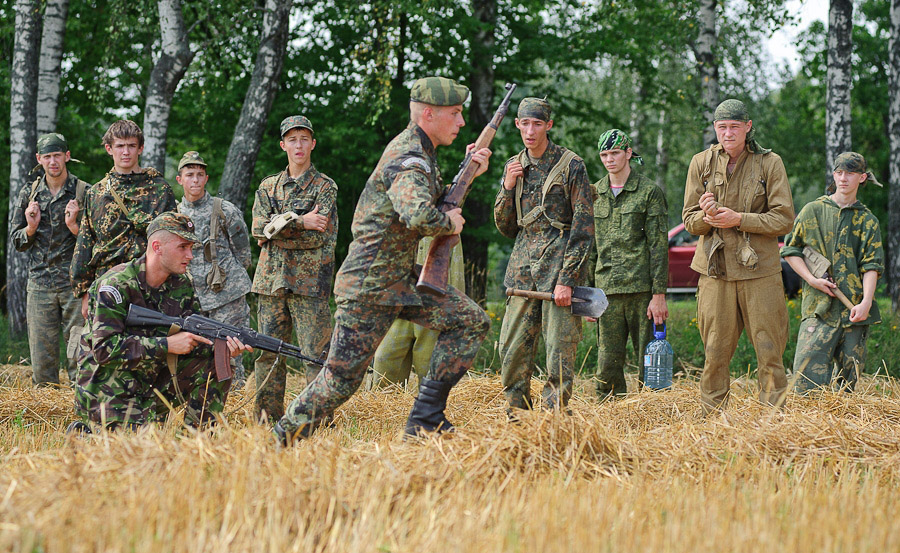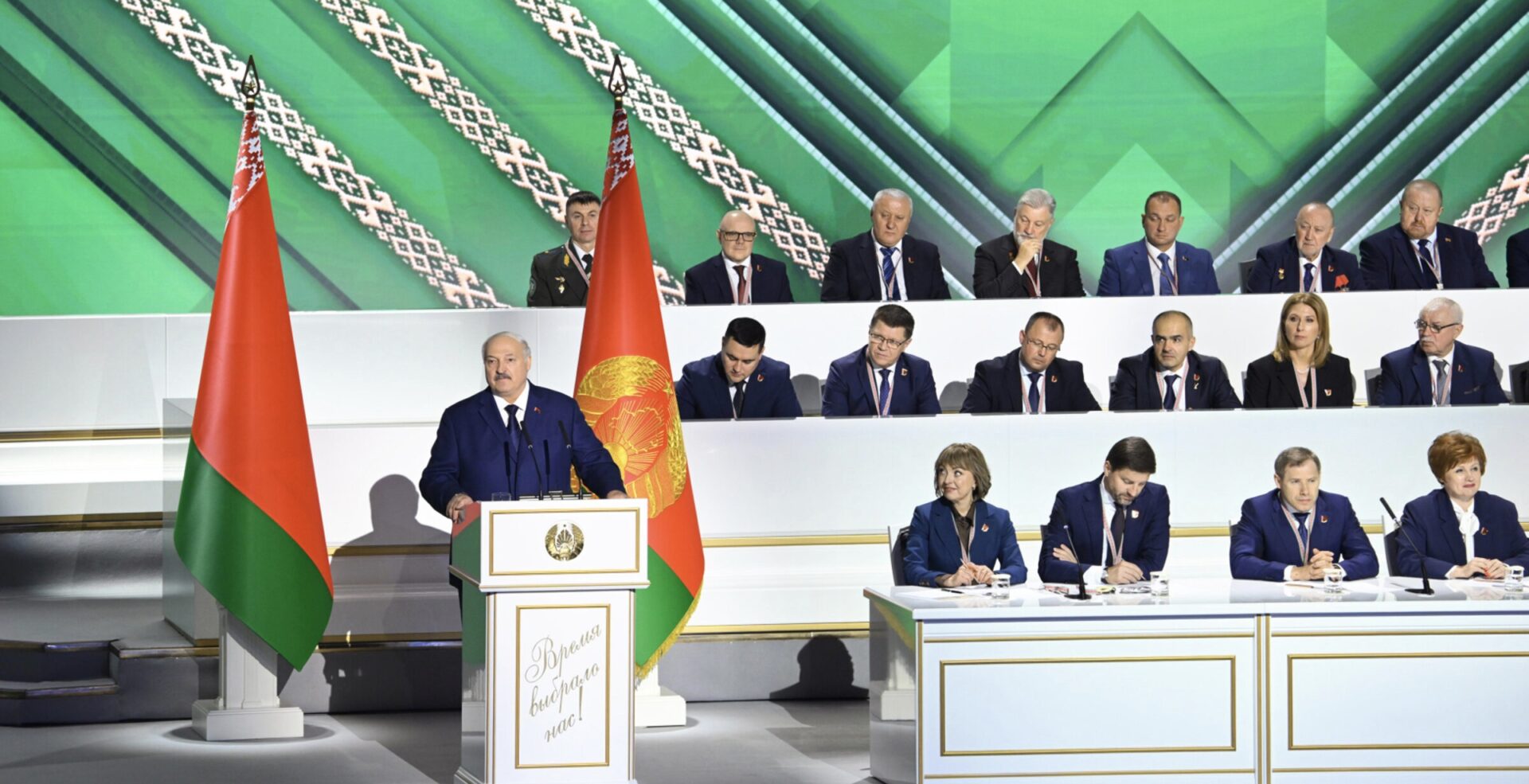
Realists Winning Tug of War Over Belarus
Realists Winning Tug of War Over Belarus
After the crackdown on the March 25 rally in Minsk, the main Belarusian daily Belarus Segodnya published an extensive report devoted to the White Legion, a group of young vigilantes under the guidance of Sergei Chislov, a graduate of Minsk Higher Engineering Anti-Aircraft Missile School (Belarus Segodnya, April 12). Reportedly, Chislov organized quasi–military training camps for volunteers with the aim to use them to stage a coup d’état. Chislov currently resides in Ukraine and maintains ties with Nikolai Statkevich, a former instructor at the Minsk Anti-Aircraft Missile School and the most intransigent opposition figure in Belarus at present. At the time of the publication of the aforementioned report, 17 people were indicted for instigating mass disorder.
On the same day this report was published, Belarusian TV aired the documentary White Legion of Black Souls, devoted to the same subject (TVR, April 12). Later on, the government-friendly political commentator Alexei Dzermant published a supportive piece under the pompous title “What does the defeat of the nationalist underground in Belarus mean?” His article insinuates a hypothetical link between the White Legion and the “Euro-Atlantic model of geopolitical tug of war”; moreover, he writes in familiar Cold War–style language such as, “Washington never concealed its interests in Europe” (Eurasia-Expert, April 26). The gist of the matter is the same: external puppet masters are purportedly steering the situation in Belarus toward a “Ukrainian Maidan” scenario.
It remains to be seen what, if anything, the official inquiry into the instigation of public disorder will yield. However, certain signs are not particularly promising in this regard. First, nobody has been charged with stashing weapons, an obvious prerequisite for any serious subversive activity. Second, the aforementioned documentary combined video sequences of the alleged subversive activity, like training camps in southern Belarus, with footage of public protests against the construction of a business center in Kurapaty (northern Minsk). Multiple collective graves of victims to Stalinist purges were found in Kurapaty in the late 1980s, and the area was turned into a commemorative site. Construction of the business center on this land was ultimately canceled in late February (Tut.by, February 27). Belarusian officialdom seems to have decided to seize the initiative by commemorating the victims of the purges this year (Svaboda.org, April 30). Third, instead of strengthening its sanctions against Belarus, the United States suspended them for the second time, which casts doubt on Washington’s alleged involvement in anti-government activity in Belarus. Sanctions were suspended despite democracy promoters’ avid pleas that “if ever Washington were going to get tougher on Minsk and let the sanctions stand, it seemed like it might be now” (Foreign Policy, May 1). Moreover, in late April, Belarusian opposition media wrote about the Donald Trump administration’s suggestion to terminate funding to the USAID’s Belarus programs altogether (Tut.by, April 25). Some commentators reasoned that this termination would make the Belarusian opposition entirely dependent on European sources of financial support. But because, these days, the European Union is more friendly to the Belarusian leadership than ever before, the opposition will become further marginalized, and its most “ideational” members will grow even more radicalized (Eurasia-Expert, May 2).
It looks like this radicalization has already occurred: notably, Vladimir Neklyaev and Nikolai Statkevich entirely declined to seek permission from the authorities to organize new demonstrations, and they even publicly referred to the EU as President Alyaksandr Lukashenka’s “helpers” (Svaboda.org, May 2). Apparently, however, such radicalization has occurred on both flanks of the Belarusian political scene. Indeed, the aforementioned publications in the Belarusian media may be attributed to a desire to fuel passions on the part of the security apparatus; or perhaps a certain faction of the leadership is waging a tug of war with its more forward-looking and realist faction.
Be that as it may, on April 29, Statkevich was put under “administrative arrest” for five days, apparently to prevent his participation in the May 1 rally that he had long announced (see EDM, April 10). This time, unlike during the run-up to the March 25 rally, Statkevich’s detention was officially announced. Prior to his arrest, the opposition leader had appealed to his supporters to appear at October Square in downtown Minsk. Some of his supporters and allies, including Vladimir Neklyaev, Pavel Severinets and Statkevich’s wife, Marina Adamovich, did arrive downtown with white-red-white flags and anti-government slogans. The police asked them to leave but did not resort to force. Denis Melyantsov, of the Belarusian Institute for Strategic Studies, gave a rundown of the various published estimates of the crowd size at October Square, on May 1. These range from 800, as reported by Charter97, which is invariably given to wild-eyed exaggerations, to 100–200, according to Euroradio and Tut.by (Facebook.com/melyantsou, May 1). Only opposition activists came to the square. Lukashenka had recently suspended his decree on social parasites, which presumably drove the drastic decline in individuals among the general public willing to come out to protest (Svaboda.org, April 30). This course of events points to realists wining the tug of war with idealists, both in the government and in the opposition.
As author Robert Kaplan has noted, realism tells the bitterest truths that not everyone wants to hear. The realists’ set of beliefs includes notions such as a) order comes before freedom; b) one must work with the material at hand; c) one should think tragically in order to avoid tragedies; and c) interests come before values (Stratfor, November 19, 2014).
In the United States, the ascendance of such realism reveals itself in the new administration’s tangible loss of interest in democracy promotion and regime change across the globe. Whereas, in Belarus, this kind of ascending realism can be seen in the growing understanding domestically that a) so-called Eurasian integration is no universal master key, but rejecting it altogether, as Ukraine tried, is harmful and unrealistic; and b) improving relations with both the EU and the US is vital because the sources of technological progress and healthy economic strategies are in the West. At the same time, more and more people in the Belarusian opposition are now realizing that working toward regime change from within through activists accountable exclusively to foreign sponsors is coming to a dead end.


